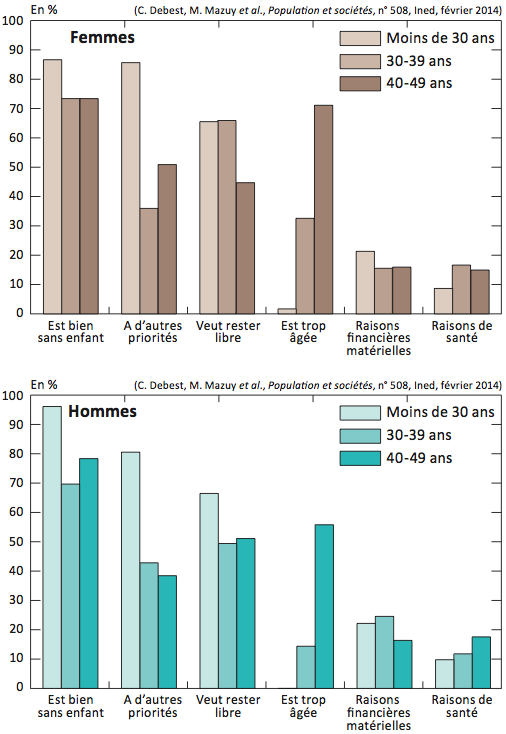According to an INED study, 5% of French people are affected by voluntary childlessness, this choice of not wanting a child. Despite social pressure, these people prefer personal development.

“Staying childless: a life choice going against the tide” is the title of the latest survey by theNational Institute for Demographic Studies (Ined) published this Tuesday. Based on several sociological works, including the famous Fecond study (2010, Inserm / Ined), the authors reveal in their research that people without children and declaring that they do not want them are relatively rare in France. So who are they? What reasons do they give for their choice? why actor these results published in the February 2014 issue of the journal Population and Societies.
5% of French people don’t want children
According to quantitative data from the Fecond survey, 6.3% of men and 4.3% of women say they have no children and do not want them. “It is undoubtedly less stigmatizing for men to make this choice than for women, given the roles still assigned to each of the sexes”, notes INED in this regard.
And this observation is not new. It is indeed consistent with the results of the Eurobarometer carried out in 2006, where 95% of French people said they wanted at least one child, and of the Study of family and intergenerational relations (Erfi) survey carried out in 2005. In addition, INED notes that the French desire for children remains strong at all ages.
A “strong” choice in view of social pressure
In addition, the Institute underlines that the declared levels of voluntary childlessness are very low among people in a couple at the time of the survey: 3% for women and 5% for men (against 10% and 17% for people not in a relationship). For INED, “these figures have been stable since 1995, and remind us that the arrival of a first child is always part of the expected marital journey (by the couples themselves and by those around them). ”
“Majority at the time of the union, childless couples gradually fall into a minority position when in their entourage the births are more and more frequent. A certain pressure, diffuse, is exerted in a progressive way on the couples not engaging in a parental project, even though they would meet the “good” conditions to have a child “, adds the Institute.
The “No kids”, a quest for personal development
Finally, the people who responded to the Fecond survey could choose, without prioritizing them, several reasons justifying their wish to remain childless, ranging from relatively subjective “libertarian” reasons, such as the desire to remain free, to reasons that might appear to be free. more objective such as age, marital status, material conditions; health reasons were also suggested.
And the “libertarian” reasons which combine the fact of being well childless, of wanting to remain free, of having other priorities, have very often been put forward by these couples in their project to remain childless. Eight times out of ten, women (79%) and men (83%) say they are “well childless”. “It is therefore the notion of personal development that shines through here,” points out INED.

Reasons for not wanting a child by age (%)
Couples without babies, happiness at stake?
But then, for these couples who think first of all about their personal development, would not having children be the recipe for happiness? It is in all that seemed to show a British study relayed recently by the Daily Mail.
In these works, the authors of the study found that people without children reported being happier than others, in general. Side explanations, spouses without offspring would make more efforts to “maintain” their relationship. They take more time to chat or go out together. They also feel more valued by their partner.
X
.














